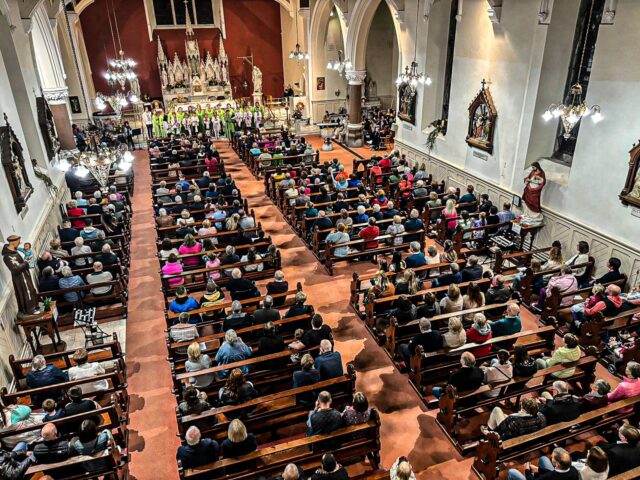What we can see we can achieve. What we can see in the depth of our heart and soul we can materialise in our lives.
This seems to be one of the important laws of existence that is expressed in the Lord’s Prayer for the Kingdom to manifest on the earthly plane as it is on the heavenly or spiritual level.
This ability to envision is what gives us the energy to realise our uniqueness and make our contribution to the world. Each of us is born with a special mission and purpose, the pursuit of which can bring us to full aliveness.
Jesus said, ‘Seek first the Kingdom and everything will be given you besides’.
It is our purpose that helps us move towards our safe harbour and provides us with all the necessary means to do so.
Not knowing that harbour, no wind can get us there. With our dream we can see the invisible and achieve the impossible.
There is no disguising the fact that the number of Priests in Ireland is declining at an alarming rate.
In 2006 there were just over 3,000 priests ministering in Irish dioceses, whereas today, March 2024, there are under 2,000. The average age of Clergy in Ireland is over 70.
It is possible that, in five years’ time, in the whole diocese of Killala, West of Ireland, there will be eight active priests to serve 22 parishes. Many rural churches are effectively being abandoned.
Parts of the traditional ‘priestly’ functions associated with events such as funerals, are increasingly being carried out by lay people.
Even though great efforts are being made to halt the decline in priestly vocations, there seems little confidence among either priests or faithful that the trend can be reversed.
Given the average age of the clergy, if the number of priests were to continue to decline at the present rate there would be few active Irish priests in Ireland by the year 2050.
It will be very disturbing for most Irish Catholics to consider the possibility that at some stage there will not be enough priests to say Mass for them.
In 1906 the Chief Secretary for Ireland, Agustine Birrell, not himself a Catholic, commented on the faith of the Irish: “It is the Mass that matters. It is the Mass that makes the difference between a Catholic country and a Protestant one”.
Up to sixty years ago, attendance at Mass on Sunday was the touchstone of Catholic identity, most especially in Ireland.
Unless, by the grace of God, there is a new surge in vocations, or unless the criteria of eligibility for ordination is changed in some way, it seems that Catholics will have to find an alternative, or at least a supplementary, source of identity.
Going to Sunday Mass is, in the first instance, an external act, requiring only a walk or drive to the nearest church. Of course, for most Catholics, Mass is much more than an external act.
Many who attend will be inspired by receiving communion, finding in it a profound experience of closeness to God.
Others may be energised by the words of the priest, or by the singing together of uplifting hymns.
For some the experience of meeting their neighbours and worshipping alongside them may be a source of comfort and strength.
Of course, there will always be a few who find Mass boring and attend out of habit, or just to meet friends, but even they may feel that going to Mass affirms their Catholic identity, even if they do nothing else to affirm it during the week. But for them, Mass can remain an external act.
If the worst comes to the worst, and priests become very scarce, it is possible that Catholics will create an alternative external form of devotion, such as a prayer service, where they will be able to gather together to worship God and share their faith.
But could the difficulty of Mass in their lives also inspire Catholics to take a closer look inwards at their own behaviour and at the inner thoughts and feelings that influence their actions?
In the earliest days of the Church, pagans were said to remark: “How these Christians love one another!” It was for this mutual love that they were noticed rather than for their religious observances.
If Mass was not readily available, one positive outcome to be salvaged from this alarming scenario is that Catholics might begin to pay more attention to our manner of living, and try to make it more of a badge of our Catholic or Christian identity.
In doing this they might be thought to be just imitating the Quakers.
Confessing the Christian Creed is the very foundation of initiation into the Catholic faith. That Creed contains the words “I believe in Jesus Christ”. This belief includes, or should include, taking the teaching of Jesus seriously, especially the more challenging passages of his Sermon on the Mount (Chapters 5-7 in Matthew’s Gospel).
Imagine if one of the badges of identity of Catholics was for them to really take seriously and show in their conduct such sayings of Jesus as “Love your enemies and pray for those who persecute you”; or “Judge not, so that you will not be judged”; or “How hard it is for those who love riches to enter the kingdom of God”.
Imagine if, when faced with insults and injury, they could pray along with Jesus, as he died on the cross of execution, “Father, forgive them, for they do not know what they are doing”.
We believe that God gives himself to us most of all in the Eucharist. But God can also give himself to us in whatever ways and at whatever times he pleases.
Matthew 25:35-37 – ‘For I was hungry and you gave me something to eat, I was thirsty and you gave me something to drink, I was a stranger and you invited me in, I needed clothes and you clothed me, I was sick and you looked after me, I was in prison and you came to visit me.’






















